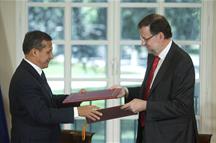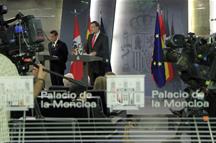Mariano Rajoy underlines that Spain will always be a "staunch proponent" of Peru in the European Union
President's News - 2015.7.8
1. Images of la meeting between the President of the Government, Mariano Rajoy, and the President of the Republic of Peru, Ollanta Humala | 2015.7.8
Moncloa Palace, Madrid
The President of the Government met at Moncloa Palace with the President of the Republic of Peru, who is on a State visit to Spain, to review political, economic, trade and development cooperation relations as well as defence issues between the two countries.
At the joint press conference they gave at the end of the meeting, Mariano Rajoy underlined that Spain's business presence in Peru has diversified and consolidated over the last five years. "Spain is the leading foreign investor in Peru. Almost 400 Spanish companies operate there and intend to stay and continue investing in the country, which offers a stable environment, respects legal certainty and hence generates confidence". He also pointed out that a growing number of small- and medium-sized Spanish enterprises have started to set up operations in Peru.
The President of the Government also congratulated Peru on its achievements in terms of economic management and in reducing poverty and inequality. He also highlighted that the country has wonderful macroeconomic figures, will grow by double the average of all Latin American countries this year, has trade agreements with the European Union and forms part of the Pacific Alliance.
Relations with the European Union
 Pool MoncloaThe meeting was also used to discuss Peru's relations with the European Union, to which end Spain "has been and always will be a staunch proponent", according to Mariano Rajoy.
Pool MoncloaThe meeting was also used to discuss Peru's relations with the European Union, to which end Spain "has been and always will be a staunch proponent", according to Mariano Rajoy.
In this regard, the President of the Government recalled that in March 2013, the Multiparty Peru-European Union Treaty came into force. He also highlighted that Spain "decisively advocated" the Visa Exemption Treaty for Peru, which was endorsed in June at the EU-CLACS Summit. "I believe that before the end of the year the process will definitively be concluded. It is a process that responds to common sense. You cannot have the free movement of goods and not the free movement of people", he said.
Mariano Rajoy added that, in the same way as Spain supports Peru in its relations with the EU, it will also continue to do so in its aspirations to become a member of the Organisation for Cooperation and Development in Europe in the not too distant future.
In terms of international politics, the two leaders spoke about various issues on the regional agenda in Latin America, about the fight against Jihadi terrorism and about climate change.
Mariano Rajoy pointed out that, with the visit of Ollanta Humala, Spain has now hosted State visits from the four founding members of the Pacific Alliance, an organisation of which Spain was the first Observer State from the European Union and with which it seeks to step up its involvement since it is "a reality of a truly dynamic nature, with global projection and political and economic vision offering a great future".
During his third visit to Spain, President Humala also met with King Felipe VI at Zarzuela Palace, with business associations, paid tribute to the martyrs of Spanish independence and visited the Royal Spanish Language Academy.
Mariano Rajoy: Greece "has made a move"
When asked about the situation of Greece, the President of the Government highlighted that, following Tuesday's meetings with the Eurogroup and with the Heads of State and Government of the Eurozone, the country "has made a move" by requesting a three-year programme from the European Stability Mechanism.
 Pool MoncloaHe also pointed out that as from next Monday, Greece has committed to undertake reforms in such areas as taxation and pensions and to follow the rules and procedures established. "This is key because you cannot have an institution like the Euro operating without rules and procedures or in which each does what they want and see fit", he argued. Mariano Rajoy also underlined the importance of the Greek Government declaring its intention to settle outstanding payments.
Pool MoncloaHe also pointed out that as from next Monday, Greece has committed to undertake reforms in such areas as taxation and pensions and to follow the rules and procedures established. "This is key because you cannot have an institution like the Euro operating without rules and procedures or in which each does what they want and see fit", he argued. Mariano Rajoy also underlined the importance of the Greek Government declaring its intention to settle outstanding payments.
According to the President of the Government, "the tune we are hearing now is different to the one we had been hearing before and that is positive; the lyrics to the tune will be heard on Thursday", when the Greek authorities present their agenda of reforms to the ESM. "What Greece needs, after receiving European support, which it will continue to have, is to grow and create jobs", which necessarily involves undertaking these reforms as a preliminary step, he claimed.
Mariano Rajoy stressed that "this situation of uncertainty must come to a stop now". In principle, a meeting of the Eurogroup will be held on Saturday, followed on Sunday by a meeting of the Heads of State and Government. "This situation must be concluded for better, as I hope, or for worse, which hopefully won't be the case", he said.
He acknowledged that this uncertainty affects Spain like the rest of the countries in the European Union and has caused the risk premium to rise and the stock markets to fall in the last few days, but far less than if the government had not carried out its own reform programme as from 2012, when Spain was "on the verge of bankruptcy and a bailout". Whatever happens, the Euro will remain, and whatever happens, Spain will continue to be a major part of the Euro", he stressed.
In terms of a possible change in economic policy in Spain, he pointed out that "the reformist policy we have undertaken has worked well and to take a backward step now would be foolish".
The President of the Government also pointed to what, in his opinion, are the priorities for the next term of office: to create jobs, to consolidate social policies, to tackle Jihadi terrorism and the problems of immigration and to be more effective in the fight against corruption, as well as to continue building Europe.





